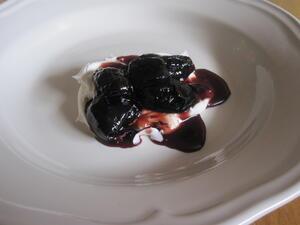Eating Jewish: Not your bubbe’s compote
You're probably thinking that prunes don’t belong in the same sentence as dessert, let alone anywhere near the sweet finish of a meal. I completely understand, because I felt the same way before I tried this new twist on the traditional compote. But let me tell you, this dessert will rock your world (or maybe your tastebuds?!) and change the way you think about prunes forever.
This recipe has garnered nothing but praise from foodies. I read about this dish long before I tried it, and on my last trip to New York I got to eat at the absolutely amazing Italian restaurant Frankies Spuntino where this dessert was created. After eating an unforgettable meal in their cozy, dimly lit dinning room, I ordered these prunes completely unprepared for how sublime this dish would be. Hot, soft, plump prunes are covered with a thick fruity wine reduction and infused with a subtle spiciness. The smooth, rich mascarpone is the perfect accompaniment.
There is a clear commonality between this dish and traditional Ashkenazi fruit compote. Both dishes feature dried fruit stewed in liquid along with the addition of sugar and spices. Yet, this is nothing like the compotes you usually see on Passover tables.
In the entry for compote in the Encyclopedia of Jewish Food, Gil Marks explains that the name "compote" comes from the Old French composte and the Latin compositum meaning "mixture." These terms were used to describe dishes in which the various ingredients were layered, often consisting of a mixture of vegetables and meat. With the appearance of sugar in the Islamic world, dishes of cooked fruit in sugar syrup began to emerge. These sorts of dishes made their way to Europe, and after the Renaissance, compote began to take the modern form we’re familiar with. In the nineteenth century, this dish became customary among the Ashkenazim due to the popularization of the sugar beet, a source of sugar.
This is probably one of the simplest desserts you’ll ever make, in terms of both the ingredients and its preparation. After combining the ingredients in a pot, it is just a matter of letting the dish simmer away for forty-five minutes. As it cooks your kitchen will be infused with a wonderfully spicy aroma, similar to the smell of freshly baked cinnamon-raisin bread. The result is a dish that will make people think you were in the kitchen for hours.
Wine-Stewed Prunes with Mascarpone
Adapted from Frank Castronovo and Frank Falcinelli
1 pound pitted prunes (about 40)
1¼ cups sugar
2 cinnamon sticks
2½ cups dry red wine
2 8-ounce containers mascarpone
1. Combine prunes, sugar, cinnamon and wine in a pot over medium-high heat. When mixture boils, reduce to simmer and cook 45 minutes, until liquid has turned to syrup.
2. Remove from heat, and rest at least 15 minutes. Spread a mound of mascarpone on each serving plate, top with 6 prunes and drizzle with syrup. Serve immediately. You can also prepare the prunes and reheat slightly before serving.







